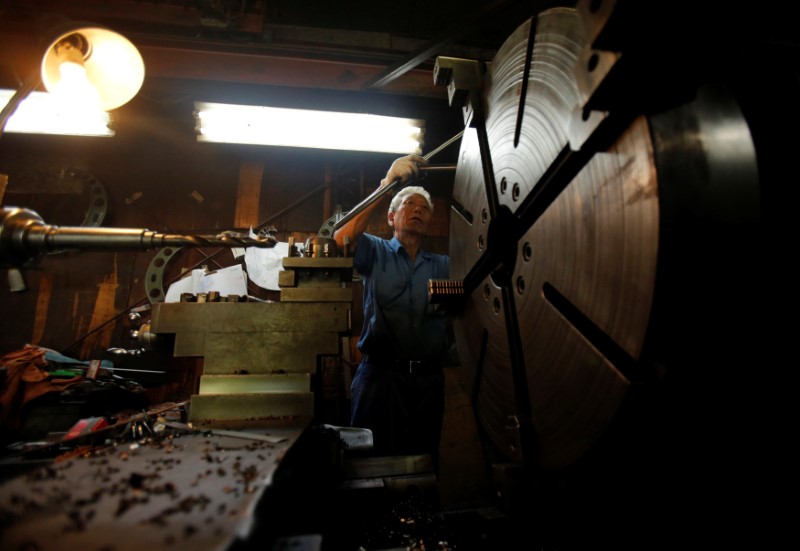By Thomas Wilson and Kaori Kaneko
TOKYO (Reuters) - More than half of Japanese companies are planning to raise the retirement age of their workforce, a Reuters poll shows, with many saying it would alleviate the country's labor shortage and harness the expertise of veteran workers.
Most Japanese companies require full-time employees to retire at 60, with an option of a further five years' work on reduced pay and terms. The system is a keystone of Japan's traditional jobs-for-life employment structure where workers are virtually guaranteed employment from graduation to retirement.
However, a shrinking and ageing population is forcing Japan to change. The government intends to raise the pensionable retirement age to 65 by 2025 to leave more people in the workforce and reduce pressure on a shriveling tax base and rising social welfare bill.
Companies including Suntory Holdings and retailer Aeon Co Ltd (T:8267) have already raised their retirement age to 65 for employees who want to continue working. Others plan to follow suit soon to cope with the highest jobs-to-applicants ratio in more than 40 years.
"We decided to raise the retirement age to strengthen our competitive edge and add value through utilising senior workers," said Keisuke Takemasu, a human resources manager at Suntory. "There's no doubt Japanese companies need to think about employment beyond 65, and I think attention is shifting to that."
In the survey, some 60 percent of companies have raised or intend to raise the retirement age for employees, with 46 percent looking to lift the cap to 65 years of age and 6 percent considering an increase to between 66 years and 70 years.
Overall, most companies - 62 percent - see raising the retirement age as a positive. Many said it would ease labor shortages and help pass on older workers' skills and know how.
"It's tough to find younger workers, so we cannot avoid raising the retirement age," a food company manager wrote in another response.
The survey showed that 47 percent of companies were already implementing the change, while more than 20 percent said they planned to roll it out over the next three years and nearly a third planned to do it over four or more years.
The survey, conducted monthly for Reuters by Nikkei Research, polled 549 big and mid-sized firms that replied anonymously. Between 246-262 companies answered the retirement age questions.
Japan's population is projected to shrink to 88 million from the current 127 million in the next four decades, with the proportion of those over 65 swelling to almost 40 percent from 28 percent, according to the National Institute of Population and Social Security Research.
HIGHER PAY
For elderly workers, maintaining regular employment status ensures continued benefits and higher pay than if they became a contract worker.
Such higher personnel costs were flagged by 34 percent of companies as a negative and impact on staff development was a greater concern; 55 percent said it could hinder the professional development of young workers, while 52 percent said it may reduce opportunities for younger employees.
"We would be unable to balance (raising the retirement age) with the recruitment of fresh graduates," wrote a manager at a retailer.
T&D Holdings Inc's (T:8795) Taiyo Life Insurance in April raised its retirement age to 65 from 60 without cutting pay or terms. It will allow employees to work until 70, on temporary contracts. Daiwa Securities Group Inc (T:8601) has removed curbs on some salespeople working beyond 70.
Other countries grappling with ageing populations such as Germany are also raising their pensionable age. Britain abolished its default retirement age of 65 in 2011.
Yoshihiro Yamashita, a labor ministry official, said raising the retirement age will help reduce labor shortages but, mindful of the financial burden on companies, the government will not look at compelling firms to raise or abolish retirement ages until after 2020.
"Companies' profitability and financial situations vary, and as the number of employees increase (after lifting retirement age), personnel costs will also go up," he said.

(To view a graphic on raising Japan's retirement age, click http://tmsnrt.rs/2tAwgN8)